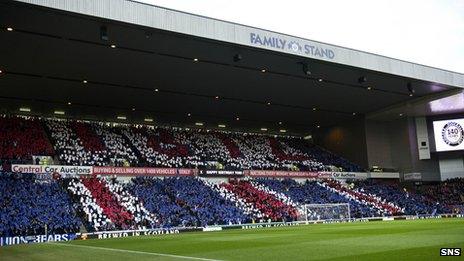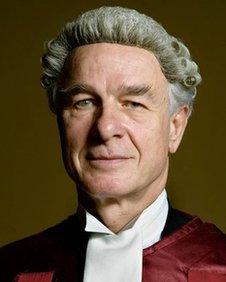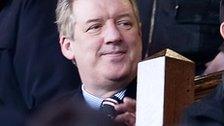Q&A: SPL EBT commission explained
- Published

Rangers fans feared being stripped of titles won during the years 2000-2011
It was a decision that had not only been long been awaited by fans of Rangers but by supporters of rivals clubs and administrators of the game.
A landmark decision that will only lead to further debate about the behaviour of those who once ran the Ibrox club, now playing in Division Three of Scottish football.
BBC Scotland looks at the process that led the commission appointed by the Scottish Premier League to investigate undisclosed payments by Rangers to impose a fine but not strip the Glasgow outfit of any league titles.
Why was the commission set up?
Rangers Football Club plc (known as oldco) went into administration in February 2012 over non-payment of £9m in PAYE and VAT taxes to HM Revenue and Customs. It finally went into liquidation in October, the business and assets having already been sold to Sevco Scotland Limited, which subsequently became The Rangers Football Club Limited (known as newco), in June.
The newco's application to inherit the oldco's membership of the Scottish Premier League was rejected by the other 11 clubs and instead it was voted into the Scottish Football League's Third Division. Meanwhile, the SPL vowed to investigate whether the way Rangers used employee benefit trust payments (EBTs) for players, which were the subject of a separate HM Revenue and Customs probe, breached its own rules.
The SPL set up a commission in August to investigate all financial, contractual and other arrangements between Rangers and its players between November 2000 and May 2011 with a view to possible sanctions should any breaches of the rules have taken place. It considered allegations that Rangers had breached SPL and Scottish Football Association rules by failing to record EBT payments and arrangements - and had therefore fielded ineligible players - and that the oldco had failed to assist the SPL in its investigations between March and August.
Who was on the commission?
Lord Nimmo Smith is a former senator of the College of Justice who has served as an insolvency judge and was one of five judges who heard the appeal of Abdelbaset al-Megrahi, the man convicted of the 1988 Lockerbie bombing, at the Scottish Court in the Netherlands.

Lord Nimmo Smith chaired the investigation for the SPL
Charles Flint QC is a commercial barrister, arbitrator and mediator specialising in banking and financial services who has wide experience in sports law. He has worked for European football's governing body, Uefa, as well as rugby unions, Grand Prix teams, the International Tennis Federation, the British Athletics Federation and the Football League.
Nicholas Stewart QC has sat as deputy High Court judge since 1992, is an appeal board chairman and specialist member of the Football Association judicial panel.
Lord Nimmo Smith had chaired an earlier SFA investigation into rule breaches at the Ibrox club, ruling that Rangers had brought the game into disrepute and that former owner Craig Whyte was not a fit and proper person to hold a position within association football. The findings from his report led to a £160,000 fine and a year-long signing ban being imposed on the Ibrox club.
What is an Employee Benefit Trust?
A trust enables an individual to own an asset on behalf of someone else. The first person is the "trustee" and the second is the "beneficiary". Company pension schemes are a common example of a trust.
With EBTs, the employer deposits money into the trust, which pays out to the beneficiaries in the form of tax-free loans.
Trusts are often postponed and are sometimes refused by the trustee, who is, in theory, acting independently of the employer.
In many cases, the loans are never repaid.
Have any other Scottish clubs been involved with EBT schemes?
BBC Scotland wrote to all of the Scottish Premier League's member clubs and asked whether they had ever operated an EBT scheme.
Celtic confirmed that it established one EBT scheme in April 2005, which BBC Scotland understands was for the benefit of the Brazilian midfielder, Juninho Paulista. The scheme was worth £765,000, but the club did not declare the trust payment to the Scottish Football Association or the Scottish Premier League.
The payments made to the trust were declared in Celtic's annual report for 2004/2005, but in 2008 the club became aware of an event giving rise to a potential tax liability that was subsequently paid after agreement with HMRC.
The remaining 10 SPL clubs replied and confirmed they had never set up an EBT scheme for any of their employees.
Why was Rangers' EBT scheme under investigation?
The SFA said in March it would investigate claims made by former Rangers director Hugh Adam that payments made to players were not disclosed to the governing body and it was announced a couple of days later that this would be carried out by the SPL.
A BBC Scotland documentary team revealed in May that a total of 53 Rangers players and staff received side contracts giving undertakings to fund their sub-trusts with cash. A total of 111 sub-trusts were set up between 2001-2010 for Rangers directors, players and other staff - along with employees of Murray International Holdings and its subsidiary companies.
Between 2001 and 2010, Rangers paid a total of £47.65m in to their Employee Benefit Trust. Details of the amounts paid in to the trust were declared in the club's annual accounts.
What was the process?
Both the oldco and newco, citing legal advice, refused to attend a preliminary hearing held in September, but the commission decided to proceed by setting a date for a formal, three-day hearing in November.
It had concluded that, because the oldco had been a member of the SPL during the period under investigation, it was bound by the rules of the league - and liable to its sanctions - despite being no longer a member. The commission also pointed out that there were sanctions that could affect the newco.
The November hearing was postponed.

The payments were made during the reign of Sir David Murray
The commission finally began its hearing on 29 January and noted in its findings that both oldco and newco Rangers made a late decision to be represented during the process.
Evidence came from witnesses, "contemporaneous documents" and from the First-tier Tribunal investigation into Rangers while under the control of Sir David Murray. Oldco Rangers won an appeal in principle against a tax bill - the so-called 'big tax case' - for use of EBTs in November, although HMRC has since lodged its own appeal against that decision.
Among those giving evidence to the SPL commission were Campbell Ogilvie, formerly Rangers company secretary and current SFA president, while the BBC Scotland investigation into the EBT payments also formed part of the evidence.
What were the sanctions available to the commission?
The commission pointed out that it had "the power to impose a wide range of sanctions" but that none in particular had been recommended by the SPL. That would be completely at the commission's discretion.
Charles Green, chief executive of newco Rangers, had vowed to challenge any sanction that stripped Rangers of any titles won during the period under investigation.
What were its findings?
Between the years 2000 and 2011, Rangers entered into side-letter arrangements with a large number of its professional players under which Oldco Rangers undertook to make very substantial payments to an offshore employee benefit remuneration trust, with the intent that they should be used to fund payments to be made to such players in the form of loans.
Those arrangements were required to be disclosed under SPL and SFA rules as forming part of the players' financial entitlement and as agreements providing for payments to be received by the players.
Oldco, through its senior management, decided that such side-letter arrangements should not be disclosed to the football authorities and the board of directors sanctioned the making of payments under the side-letter arrangements without taking any legal or accountancy advice to justify the non-disclosure.
What was its decision?
The commissioners decided unanimously that, although the payments in this case were not themselves irregular and were not in breach of SPL or SFA rules, the scale and extent of the proven contraventions of the disclosure rules required a substantial penalty - £250,000 - to be imposed.
The commissioners ruled that Rangers did not gain any unfair competitive advantage from the contraventions of the SPL rules, nor did the non-disclosure have the effect that any of the registered players were ineligible to play, and for this and other reasons no sporting sanction or penalty should be imposed upon Rangers.
Rangers administrator's failure to respond "timeously" to requests for information was also considered a breach of the rules. However, it was decided that no separate financial would be imposed on the oldco.
- Published4 February 2013
- Published20 November 2012